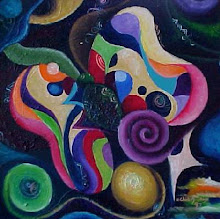Friday, April 2, 2010
Mayor of Casterbridge Question 9
Mayor of Casterbridge Question 6
Thursday, January 14, 2010
A Journey Through the Psyche
One of my most treasured and stimulating intellectual journeys was when I read Michio Kaku's book "Hyperspace". The book is a beautiful exploration of critical subjects such as the existence of other spatial dimensions, parallel universes, and the beginning of the universe (which Kaku theorizes could have been a tear in the space-time of some other universe). When I first looked at the book, I flipped to a section describing a theoretical story. It talked about a man who wanted to build a house out of an unfolded tesseract (a four dimensional cube). The house would like three cubes stacked on top of each other, with another layer of cubes protruding from the sides, and then a fifth cube by itself at the top. A man and his wife did not believe he could do it. Nevertheless, he proceeded to get it built, and actually succeeded. Now keep in mind he did not build something in four dimensions; it is simply a three dimensional outline of a four dimensional hypercube. Tragically, before showing the masterpiece to the skeptical couple, an earthquake hit and the house collapsed. When the couple and the man came to look at it, there was mysteriously one cube left. The trio entered inside cautiously, only to be shocked beyond their minds’ comprehension. What they saw was incredible. They could see a series of rooms go on for seeming infinity in front of them. Frantically, they tried to leave the house, but when they went out the entrance it only led to another room. They kept going through doors but they only led to other rooms! Eventually, they found a window. Upon looking outside they saw they were kilometers above the empire state building. Looking through another window, they were above the ocean. Through another window they saw infinite darkness. Simply nothing. Eventually, they found a window with a reasonable area to step into, and basically escaped through a portal in space. What had happened was when the earthquake occurred, the three dimensional outline collapsed back into a four dimensional hypercube! Reading this intrigued me. I wondered, and still wonder today, would it be possible to recreate such a wonderfully coincidental tear in the universe? Hopefully time will tell.
372 words.
Thursday, December 31, 2009
12/31/09
3rd Period
3. Blogging, in a manner of speaking, is overrated. Changing the standard form of assignments shows a typical impulsive act of human behavior; the blurred conception that just because something is new, it is better. Despite some obvious benefits, blogging is full of holes compared to the traditional means of assignment. For example, paper and pencil is foolproof; 98% of things that can happen to it would be the student's fault. Blogging however, poses numerous problems that would not be a matter of whether the student is attentive enough to keep up with their "things". Internet connection problems, website server errors(which could possibly cause the students' work to be lost, by no fault of their own), and other little bugs that could easily plague assignments that are worked on so diligently by those in the class. In short, blogging has been pursued to satisfy the urge to live in some sort of "cyber society" more than to increase actual efficiency. It is not a wise alternative.
English 3rd Period
12/31/09
2. There is a hideous misconception here- Steinbeck did not want a Aesop-esque moral here so we can go home and implement this cute little dote of wisdom into our lives which are usually void of such perfectly fitting symmetry. Steinbeck was a realist. The point of this book was to show us the sometimes bitter hand of reality coming and taking away our dreams which fit inside our minds so perfectly, but not into the true world. George and Linnie had a dream. By a completely unjust, immoral, and sick turn of events this dream was ground into sand and tossed into the wind, only to be seen again in the hallucinatory fashion of dreams. Steinbeck had events like this in his own life; they did not fit together. Rather, they clashed and fought and tore at him so much he felt he needed to warn the world of such evil through Of Mice and Men. This in fact, is the "point" of the novel.
Of Mice and Men Question 1
12/31/09
English 3rd
1. As with any movie adaption of a literary work, the people making the movie (if they have any sort of commercial drive, which has been inherent in every businessman since the dawn of time) will adhere to certain demands, such as accessibility, moral satisfaction, etc. Because of these standards, books and movies are almost always strikingly different. Certain things that are just "given" in the book have to be shown in the movie, such as George's uneasiness towards Curley's wife. In turn, certain people may consider the movie inadequate, too separate from the original, etc.
The Of Mice and Men movie was far too accentuated. That is, certain parts that readers mistook to be extremely important were dramatized too much in the movie, making them lose their realistic value.
